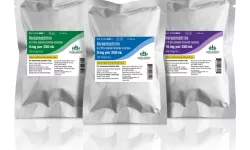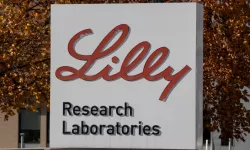Industry News

PRINCETON, NJ — Bristol Myers Squibb announced that the U.S. Food and Drug Administration (FDA) has granted accelerated approval of Augtyro™ (repotrectinib) for the treatment of adult and pediatric patients 12 years of age and older with solid tumors that have a neurotrophic tyrosine receptor kinase (NTRK) gene fusion, are locally advanced or metastatic or where surgical resection is likely to result in severe morbidity, and have progressed following treatment or have no satisfactory alternative therapy. The approval is based on results from the Phase 1/2 TRIDENT-1 study, which evaluated Augtyro in adult patients with NTRK-positive solid tumors. This indication is approved under accelerated approval based on overall response rate and duration of response. Continued approval for this indication may be contingent upon verification and description of clinical benefit in the confirmatory trials.
“NTRK fusion-positive tumors can present challenges in the clinical setting, which is why it is important that we have additional treatment options for these patients,” said Alexander Drilon, MD, TRIDENT-1 global trial lead and Chief of the Early Drug Development Service at Memorial Sloan Kettering Cancer Center. “The FDA approval of repotrectinib adds an important tool to our toolbox, offering oncologists a next-generation TKI that can be used across a broad range of NTRK fusion-positive solid tumors for both TKI-naïve and TKI-pretreated patients.”
The TRIDENT-1 trial included both TKI-naïve (n=40) and TKI-pretreated (n=48) patients with NTRK-positive locally advanced/metastatic solid tumors collectively representing 15 different types of cancer. In TKI-naïve patients, with a median follow up of 17.8 months, 58% (95% CI: 41 to 73) had a confirmed objective response rate (cORR); of those, 43% experienced partial responses (PR) and 15% had complete responses (CR). Of the TKI-naïve responding patients, 83% were still in response at one year with Augtyro. The median duration of response (mDOR) was not yet reached. In TKI-pretreated patients, with a median follow up of 20.1 months, the cORR was 50% (95% CI: 35 to 65); of those, 50% experienced PR and no patients achieved CR. Additionally, 42% of TKI-pretreated responding patients were still in response at one year with Augtyro. The mDOR was 9.9 months (95% CI: 7.4 to 13.0). Among those who had measurable central nervous system (CNS) metastases at baseline, intracranial response was observed in 2 out of 2 TKI-naïve patients and in 3 out of 3 TKI-pretreated patients.
Augtyro is associated with the following Warnings & Precautions: central nervous system (CNS) effects, interstitial lung disease (ILD)/pneumonitis, hepatotoxicity, myalgia with creatine phosphokinase elevation, hyperuricemia, skeletal fractures, and embryo-fetal toxicity.
“FDA approval of Augtyro for patients with NTRK-positive tumors adds to its indication in ROS1-positive NSCLC, showing its clinical value for more people across multiple genetic markers,” said Nick Botwood, senior vice president of Medical Oncology at Bristol Myers Squibb. “Previously, there was not an FDA approved treatment option for NTRK-positive cancers that was studied in both TKI-naïve and TKI-pretreated patients across solid tumors. This milestone helps address this area of unmet need and builds on Bristol Myers Squibb’s longstanding legacy of bringing innovations to individuals who are facing cancer and urgently seeking new treatment options.”
“Cancer can be frightening regardless of the type, but having a rare gene fusion driving it can be especially stressful and isolating,” said Susan Spinosa, president and patient co-founder of NTRKers, a patient advocacy group. “It’s exciting to know that there’s a new targeted therapy option for patients with NTRK-positive gene fusions, as this may offer hope to patients and their loved ones navigating this difficult journey.”
Based on clinical and pharmacokinetic data, the recommended dose for Augtyro for pediatric patients aged 12 years and older is the same as for adults, 160 mg orally once daily for 14 days followed by 160 mg twice daily until disease progression or unacceptable toxicity. The safety and effectiveness of Augtyro have not been established in pediatric patients younger than 12 years of age with solid tumors who have an NTRK gene fusion. This is the second indication for Augtyro in the U.S., following its full approval for the treatment of adult patients with locally advanced or metastatic ROS1-positive NSCLC in November 2023.
Disclosure: Dr. Drilon has provided advisory and speaking services to Bristol Myers Squibb.

ALEXANDRIA, VA — The National Community Pharmacists Association (NCPA) today launched a push for payment reform that educates patients on how pharmacy benefit managers are increasing prescription drug prices. The national campaign, featuring television, digital and print ads, aims to push Congress to enact PBM payment reform that has broad bipartisan support in both houses.
As part of the launch, NCPA also released the results of a new poll revealing widespread public concern over prescription drug costs and PBMs:
- 84% of respondents agree that prescription drug costs are too high.
- 73% are concerned about PBMs' impact on drug pricing.
- 68% agree that PBMs are driving up drug costs.
- 60% would be more likely to vote for a candidate who supported legislation addressing PBM abuses.
- 62% support Congress having some oversight into the practices of PBMs to ensure fair pricing and transparency.
The campaign will target patients across the country with educational material.
"Eighty percent of all prescriptions in the U.S. are controlled by just three pharmacy benefit managers, and they are all owned by or affiliated with the largest insurance companies in the country," said NCPA CEO B. Douglas Hoey, pharmacist, MBA. "These are Fortune 15 corporations that behave like monopolies, and they are hurting patients with higher prescription costs and killing off small businesses at the average rate of one every day. There is broad bipartisan support in Congress for reform, and we are determined to get it passed before the end of the year.
"As the national poll shows, most patients don't know very much about PBMs, despite that they have so much control over which prescription patients take and how much they pay for those drugs. So, while we want pharmacy teams to continue their advocacy, this campaign is aimed at patients. We want them to let their members of Congress know that PBM reforms must be enacted this year."

ROSEMONT, IL — It is a New Day for Norepinephrine! Long Grove Pharmaceuticals now offers ready-to-use Norepinephrine in 0.9% Sodium Chloride in the 16 mg/250mL (64 mcg/mL) strength and anticipates the availability of the 4 mg/250 mL (16 mcg/mL) and 8 mg/250 mL (32 mcg/mL) strengths in early summer.
This ready-to-use premix has a 24-month shelf life at room temperature and is safe to use up to seven days after removal from the foil overwrap. A new source for Norepinephrine is a much needed addition to the fragile critical care supply chain. The convenience and safety of this manufactured premix formulation will help hospital pharmacies focus their limited resources on addressing unique and critical patient needs.
“We’re very happy to help play a role in relieving some of the stresses that our hospital pharmacy colleagues face every day. Over the last six months, we have met with many customers who have shared their ongoing challenges and have been very supportive of our efforts to bring a safe, convenient premix Norepinephrine to market.” said Peter Karas, Chief Commercial Officer of Long Grove Pharmaceuticals.
Norepinephrine in 0.9% Sodium Chloride Injection is indicated to raise blood pressure in adult patients with severe, acute hypotension, and it is one of the most commonly used injectable medications in the critical care setting.

NEW YORK, NY — The FDA Peripheral and Central Nervous System Drugs Advisory Committee unanimously voted that donanemab shows clinical benefit for the treatment of early Alzheimer's disease. If approved, donanemab, developed by Eli Lilly, would become the second disease-modifying drug for Alzheimer's to receive full approval, expanding the arsenal of available drugs needed to treat Alzheimer's with combination therapy.
"Today's vote offers hope that donanemab will be approved in the coming months, but it's important to look at this milestone in the larger treatment landscape for Alzheimer's, which will entail a combination therapy and precision medicine approach," says Dr. Howard Fillit, Co-Founder and Chief Science Officer of the Alzheimer's Drug Discovery Foundation (ADDF). "If approved, donanemab will expand the first class of disease-modifying drugs, serving as the building blocks for future generations of drugs. Anti-amyloids are not a silver bullet, but they offer opportunities for patients to modify the course of the disease while the field works towards developing more novel therapies that target the underlying biology."
The donanemab trials demonstrate the field's ability to conduct innovative and rigorous biomarker-powered trials that provide a definitive answer on a drug's effectiveness. By using a "goldilocks strategy," the TRAILBLAZER-ALZ 2 trial used both amyloid and tau imaging to identify patients who were in the early stages of Alzheimer's and most likely to benefit from treatment.
"It's encouraging to see that some patients essentially enter remission, where they achieve full amyloid clearance with donanemab, with no resurgence in substantial plaque buildup for nearly four years," notes Dr. Fillit. "These findings are a direct result of biomarker tests that can detect, quantify, and monitor plaque buildup in the brain. Biomarkers will continue to revolutionize clinical trial design as we move towards developing drugs that target novel pathways guided by the biology of aging."
This milestone comes at a critical time when drug development is now largely driven by the biology of aging approach. In the current pipeline, nearly 75% of Alzheimer's drugs in development are exploring novel targets related to the various aging pathways like inflammation, metabolic disturbances, and vascular dysfunctions. Some of the promising drugs are from ADDF-funded companies such as Coya Therapeutics, which is developing a combination therapy targeting neuroinflammation, as well as Therini Bio, which is developing a drug to target vascular dysfunction, and PharmatrophiX, which recently completed a phase 2a trial for a neuroprotective drug now ready for phase 2b trials.
Diversity in the drug pipeline coupled with recent advances in biomarkers—notably the advent of accessible and scalable blood-based biomarkers—sets the stage for a new frontier in Alzheimer's care where early detection, diagnosis, and intervention is feasible. Biomarkers will also be integral to the prevention of the disease by identifying patients in the preclinical phase before symptoms present and reducing Alzheimer's risk based on their individual biomarker profiles.
"Today's advisory committee endorsement is a milestone achievement for the researchers, patients, families, and caregivers who have dedicated years to advancing new treatment options, but our work does not end here. We must continue fostering innovation and progress to move closer to the day where Alzheimer's is treated on an individual basis with the help of precision medicine, ultimately halting the progression or preventing the onset of the disease altogether," closes Dr. Fillit.

WASHINGTON, PA – Washington Health System is pleased to announce it has officially joined UPMC, becoming UPMC Washington and UPMC Greene.
In June of 2023, the Boards of Directors of Washington Health System (WHS) and UPMC announced an affiliation agreement between the two entities that would integrate WHS into the UPMC system. One year later, on June 1, 2024, that affiliation became official, ensuring a future of excellent patient care for residents of Washington, Greene and surrounding counties.
“We are elated that the affiliation is complete and look forward to starting a new chapter of collaboration with UPMC,” said Brook Ward, president of UPMC Washington and UPMC Greene. “This affiliation protects the vitality of an essential community asset and solidifies a healthy future for Washington and Greene counties for generations to come.”
UPMC has committed to invest at least $300 million over 10 years to enhance clinical services and upgrade facilities at UPMC Washington and UPMC Greene. These investments by UPMC, combined with contributions the WHS Foundation has made and will continue to make, ensures UPMC Washington and UPMC Greene can provide state-of-the-art health care for local residents for years to come and maintain its position as one of the largest employers in Washington and Greene counties.
“Our focus is on ensuring residents have access to life-saving services and advanced care that is sustainable into the future and preserving jobs of our talented health care workers,” said Ward. “The community is gaining close-to-home access to the nationally recognized, high-specialty care of UPMC. Our local capabilities will expand, creating a destination for world-class care in southwestern Pennsylvania.”
Clinical collaborations between WHS and UPMC for oncology (UPMC Hillman Cancer Center joint venture), pediatric specialties (UPMC Children’s Hospital of Pittsburgh), women’s health (UPMC Magee-Womens) and heart and vascular care (UPMC Heart and Vascular Institute), have been in place for more than a decade, providing care for more than 10,000 patients annually. UPMC will continue to invest in and advance key services locally, including inpatient and emergency care, women’s health, cardiology, surgical services, diagnostics, primary care and specialty and outpatient services.
“UPMC has a long, successful track record of affiliations with like-minded organizations. We know how essential these hospitals are to this region to preserve needed health care services and livelihoods of thousands touched by them, and we are thrilled to welcome UPMC Washington and UPMC Greene to UPMC,” said Leslie C. Davis, president and CEO of UPMC.
UPMC Washington and UPMC Greene will maintain a local Board of Directors consisting of 11 legacy WHS board members and five newly appointed members from UPMC.
The affiliation does not affect community members’ in-network access to WHS hospitals or doctors. UPMC Washington, UPMC Greene and their affiliated outpatient facilities will continue to honor the contracts that are in place with regional and national insurers.
A formal celebration of the affiliation and a press conference will be announced in the coming days.

CAMBRIDGE, MA and RAHWAY, NJ — Moderna, Inc. and Merck, known as MSD outside of the United States and Canada, announced the first presentation of results from a planned analysis from the Phase 2b randomized KEYNOTE-942/mRNA-4157-P201 study, a clinical trial evaluating mRNA-4157 (V940), an investigational individualized neoantigen therapy (INT), in combination with KEYTRUDA, Merck's anti-PD-1 therapy, in patients with resected high-risk melanoma (stage III/IV) following complete resection (n=157). With a median follow-up of approximately three years (34.9 months), adjuvant treatment with mRNA-4157 (V940) in combination with KEYTRUDA continued to demonstrate a clinically meaningful and durable improvement in recurrence-free survival (RFS), the primary endpoint of the study, reducing the risk of recurrence or death by 49% (HR [95% CI], 0.510 [0.288-0.906]; two-sided nominal p-value 0.019) compared with KEYTRUDA alone. mRNA-4157 (V940) in combination with KEYTRUDA also continued to demonstrate a meaningful improvement in distant metastasis-free survival (DMFS), a key secondary endpoint of the study, compared with KEYTRUDA alone, reducing the risk of developing distant metastasis or death by 62% (HR [95% CI], 0.384 [0.172-0.858], two-sided nominal p-value 0.015).
These data are being presented during a rapid oral abstract session at the 2024 American Society of Clinical Oncology (ASCO) Annual Meeting (abstract #LBA9512). With an additional year of planned follow-up, these data build on the earlier analysis of the primary and key secondary endpoints of the study, presented in 2023. The 2.5-year recurrence-free survival rate of mRNA-4157 (V940) in combination with KEYTRUDA was 74.8%, as compared to 55.6% for KEYTRUDA alone, with the benefit observed across exploratory subgroups.
"We are encouraged by the latest results from the KEYNOTE-942/mRNA-4157-P201 study. These data highlight the sustained benefit in RFS and DMFS of mRNA-4157 (V940) as adjuvant treatment in combination with KEYTRUDA in people with resected high-risk melanoma. Importantly, this benefit was observed across various patient exploratory subgroups, reflecting the potential of mRNA-4157 (V940) for a broad range of these patients," said Kyle Holen, M.D., Moderna's Senior Vice President and Head of Development, Therapeutics and Oncology. "These findings reinforce our commitment to advancing this innovative treatment in collaboration with Merck, and we are dedicated to harnessing mRNA technology to potentially transform cancer therapy and improve patient outcomes."
"The sustained improvements in recurrence-free survival and distant metastasis-free survival observed at approximately three years in the KEYNOTE-942/mRNA-4157-P201 study provide further support of the potential of mRNA-4157 (V940) in combination with KEYTRUDA to help patients with resected high-risk melanoma," said Dr. Marjorie Green, senior vice president and head of oncology, global clinical development, Merck Research Laboratories. "We look forward to building on our legacy of turning breakthrough science into medicines that may have a meaningful impact on patients' lives as we continue advancing our broad clinical development program evaluating this novel approach with Moderna."
Additional efficacy and subgroup data
Data from an exploratory subgroup analysis of the Phase 2b KEYNOTE-942/mRNA-4157-P201 study in patients with resected high-risk melanoma (stage III/IV) following complete resection showed that improvement in RFS was observed with mRNA-4157 (V940) in combination with KEYTRUDA compared to KEYTRUDA alone regardless of tumor mutational burden (TMB) or programmed death-ligand 1 (PD-L1) status.
The RFS benefit of mRNA-4157 (V940) in combination with KEYTRUDA compared to KEYTRUDA alone was maintained across both TMB high (HR [95% CI], 0.564 [0.253-1.258]), TMB non-high (0.571 [0.245-1.331]), PD-L1 positive (0.471 [0.226-0.979]), PD-L1 negative (0.147 [0.034-0.630]), and circulating tumor DNA (ctDNA) negative (0.207 [0.091-0.470]) subpopulations. ctDNA positive HR was not estimable due to the small sample size. There were no significant associations between individual human leukocyte antigen (HLA) alleles and RFS observed for mRNA-4157 (V940) in combination with KEYTRUDA.
The exploratory endpoint of overall survival (OS) favored mRNA-4157 (V940) in combination with KEYTRUDA compared to KEYTRUDA alone, with a 2.5-year OS rate of 96.0% vs. 90.2%, respectively (HR [95% CI], 0.425 [0.114-1.584]).
The safety profile with mRNA-4157 (V940) in combination with KEYTRUDA in KEYNOTE-942/mRNA-4157-P201 remains consistent with the primary analysis. The most common adverse events attributed to mRNA-4157 (V940) in combination with KEYTRUDA were fatigue (60.6%), injection site pain (56.7%), and chills (49.0%). The majority of the adverse events attributed to mRNA-4157 (V940) were Grade 1-2, with fatigue being the most common Grade 3 event and no Grade 4-5 events. Immune-related adverse events occurred in 37.5% of patients receiving the combination and 36% receiving KEYTRUDA alone.
Ongoing clinical development programs
Merck and Moderna have initiated Phase 3 randomized clinical trials evaluating mRNA-4157 (V940) in combination with KEYTRUDA as an adjuvant treatment in patients with resected high-risk (Stage IIB-IV) melanoma (INTerpath-001, NCT05933577) and non-small cell lung cancer (INTerpath-002, NCT06077760). Both trials are actively enrolling.
In 2024, Merck and Moderna also initiated a two-part Phase 2/3 randomized clinical trial evaluating mRNA-4157 (V940)in combination with KEYTRUDA as neoadjuvant and adjuvant treatment in patients with resectable locally advanced Stage II-IV (M0) cutaneous squamous cell carcinoma (INTerpath-007, NCT06295809), a Phase 2 randomized clinical trial evaluating mRNA-4157 (V940) in combination with KEYTRUDA as adjuvant treatment in patients with intermediate-high-risk, high-risk, or M1 no evidence of disease renal cell carcinoma (INTerpath-004, NCT06307431), and a Phase 2 randomized clinical trial evaluating mRNA-4157 (V940) in combination with KEYTRUDA as adjuvant treatment in patients with high-risk muscle-invasive urothelial carcinoma post-radical resection (INTerpath-005, NCT06305767).

SAN FRANCISCO, CA — Plenful, an AI workflow automation platform streamlining pharmacy and healthcare operations, announced a $17M Series A round, increasing its total raised capital to more than $25 million. This signifies a meaningful step forward in Plenful's mission to modernize pharmacy operations through advanced automation and artificial intelligence.
"Having years of firsthand experience in the trenches of pharmacy and healthcare operations, we intimately understand the challenges faced by professionals in the field," said Joy Liu, CEO and Founder of Plenful. “Our mission is to empower pharmacy and healthcare teams with tools that alleviate the burden of manual administrative tasks, allowing them to focus on what matters most – providing exceptional patient care and empowering their staff. Fueled by new capital, we will continue building out our robust infrastructure, focusing on customer needs in each unique automation set, and expanding the use of machine learning with a focus on LLMs to create the best possible, seamless experience for customers.”
The U.S. healthcare system faces nearly $1 trillion in manual and administrative labor costs, worsened by post-COVID labor shortages and employee burnout. This inflates expenses and hampers service efficiency, ultimately compromising patient care. Moreover, recent significant declines in pharmacist graduation rates have compounded the administrative challenges faced by pharmacy operation teams.
Plenful, founded by experienced pharmacy and healthcare operators, provides a practical solution: a highly-configurable AI software designed to streamline and automate a variety of pharmacy administrative tasks in one platform. Available for health system pharmacies, specialty pharmacies, long term care pharmacies, compounding pharmacies, specialty providers, and more, Plenful reduces manual work by up to 97 percent and can identify millions of dollars in savings opportunities.
Leveraging AI and machine learning, Plenful addresses key pain points in the industry, driving revenue growth and decreasing time and costs for its customers, which include Tampa General Hospital, Renown Health, Salinas Valley Health, Blue Cross Blue Shield, and dozens of other innovative healthcare teams.
Leveraging AI and machine learning, Plenful addresses key pain points in the industry, driving revenue growth and decreasing time and costs for its customers, which include Tampa General Hospital, Renown Health, Salinas Valley Health, Blue Cross Blue Shield, and dozens of other innovative healthcare teams. Plenful's platform offers several core use-cases that address critical customer pain points in pharmacy and healthcare operations:
- 340B Auditing, Financial Reporting, and Missed Opportunities Identification: A complete 340B solution designed to handle 100% of compliance volume auditing, financial reporting, and capture missed savings. Plenful’s solution is configured and tailored to their customers specific requirements and disparate data feeds.
- Contracted Rates and Inventory Optimization: The leading payer rates and inventory solution for pharmacies, Plenful optimizes inventory planning, detects rate discrepancies to maximize revenue capture, proactively monitors and alerts for shortages and waste, and forecasts inventory demand. With Plenful, pharmacies can seize missed revenue opportunities, enhance inventory planning, and free their teams from manual tasks.
- Intelligent Document Data Entry Automation: Plenful’s intelligent document solution streamlines this process end-to-end, accurately and efficiently extracting relevant information, enhancing operational efficiency and minimizing errors. Customers can customize the solution with their specific business logic and layer on complex crosswalks, leading to the automation of more than 95% of manual work.
"Our organization has greatly benefited from Plenful's automated software, which has streamlined the oversight of our 340B program. Their team members who supported our go-live efforts were knowledgeable, responsive, and attentive to our organization's needs. I recommend Plenful to any organization seeking to leverage machine learning to sustain and advance their 340B program," said Clement Miller, Chief Operating Officer at Salinas Valley Health.
The Series A funding round was led by TQ Ventures, with participation from Bessemer Venture Partners, Mitchell Rales (Co-founder and Chairman of Danaher), Susa Ventures, and existing investors.
“The ongoing pharmacy labor shortages and increasing workflow complexities highlight the urgent need to enhance operations and reduce administrative burdens through AI and automation technology,” said Andrew Marks, partner and co-founder at TQ Ventures. “We invested in Plenful because of their team, their deep understanding of customer pain points, their strong progress and execution, and their vision for a better healthcare system. As a venture capital firm that backs founders building the future, we believe Plenful represents the future of pharmacy and healthcare operations."

TEL AVIV, ISRAEL — BioLineRx Ltd., a commercial stage biopharmaceutical company pursuing life-changing therapies in oncology and rare diseases, today announced a multi-center Phase 1 clinical trial sponsored by St. Jude Children's Research Hospital, Inc. to evaluate motixafortide for the mobilization of CD34+ hematopoietic stem cells (HSCs) used in the development of gene therapies for patients with sickle cell disease (SCD). Investigators in the trial from St. Jude Children's Research Hospital, Inc. and two other clinical sites have extensive SCD gene therapy clinical development experience and are recognized leaders in the field.
Hematopoietic stem cell transplantation after genetic modification is potentially curative for patients with SCD. Significant quantities of HSCs (minimum 16.5-20 million cells/kg) are required for genetic manipulation and transplant success, however, the most commonly used drug for collection of stem cells, granulocyte colony-stimulating factor (G-CSF), is contraindicated in patients with SCD. Peripheral blood mobilization of stem cells using the mobilization agent plerixafor is the current strategy to collect HSCs for SCD gene therapies, however limitations exist including the need for multiple collection cycles to achieve the necessary HSC yields. For some, gene therapy may be prohibitive by the failure to obtain adequate numbers of HSCs.
"The recent FDA approvals of two gene therapies for sickle cell disease in the U.S. is an exciting development for the sickle cell community," said Ella Sorani, PhD, Chief Development Officer at BioLineRx. "Through this new trial with St. Jude, and our ongoing collaboration with investigators at Washington University School of Medicine in St. Louis, we are excited to be working with leaders in gene therapy and stem cell mobilization to evaluate potential new mobilization options for patients with SCD."
Enrollment in the St. Jude Children's Research Hospital, Inc. study is expected to begin in the next few months. Initial data from the Washington University School of Medicine in St. Louis sponsored clinical trial (ClinicalTrials.gov Identifier: NCT05618301) is anticipated in the second half of 2024.
Motixafortide, BioLineRx's lead therapeutic candidate, was approved by the U.S. Food & Drug Administration (FDA) in September 2023, in combination with filgrastim (G-CSF), to mobilize HSCs for collection and subsequent autologous transplantation in patients with multiple myeloma, under the brand name APHEXDA®.

PITTSBURGH, PA — Imagine Pharma, a biotech company focused on advancing the commercialization of its novel IMG-1 polypeptide in Oral Delivery, Therapeutics, and Regenerative Medicine, announced today that the West Virginia University (WVU) Health System, which operates under the brand WVU Medicine, has awarded a contract to the Company to provide human clinical islet isolation services for patients undergoing a total pancreatectomy and autologous islet cell transplant (TPAIT). TPAIT is a surgical procedure to remove the diseased pancreas, harvest the insulin-secreting islet cells of the pancreas, then reinfuse or transplant those cells into the patient to manage blood sugar. Pancreatectomy without the islet transplant would result in diabetes or the inability to regulate blood sugar.
The WVU Health System is the state's largest health system and largest private employer, operating 21 hospitals. Its flagship hospital, WVU Medicine J.W. Ruby Memorial Hospital, has been nationally recognized as an approved NPF Center by the National Pancreas Foundation for its focus on multidisciplinary treatment of pancreatitis.
"Autologous islet transplantation offers a reliable, scalable, cost-effective approach to chronic or total pancreatitis, providing patients with reduced pain and better quality of life," said Brian Boone, M.D., Surgical Oncologist at the WVU Cancer Institute and Assistant Professor in the Department of Microbiology, Immunology, and Cell Biology at the WVU School of Medicine. "We are excited to work with Imagine Pharma as we grow our islet cell transplantation program."
Imagine Pharma has successfully completed the first islet isolation procedure for WVU Medicine, which was performed by Imagine Pharma at the Cook MyoSite facility in Pittsburgh, Pennsylvania.
"We look forward to working with the team at WVU Medicine to support their work in this critical area and contribute to better outcomes for their patients," said Dr. Rita Bottino, Director of Islet Services at Imagine Pharma, and an expert in the field of islet isolation.

ST. LOUIS, MO — Express Scripts, the pharmacy benefits services business of The Cigna Group's Evernorth, is making it easier for people to access a broader range of care services at independent pharmacies. This new collaboration with CPESN® USA, a network of pharmacy providers that deliver health services, is a direct result of guidance from the organization's Independent Pharmacy Advisory Committee, which includes 38 pharmacists from all regions of the United States and is led by former independent pharmacy owner, Stephanie Smith Cooney, Pharm.D, senior director of independent pharmacy affairs at Express Scripts.
"Local pharmacies are the doorway to essential health care for many people, and independent pharmacies are critical to closing gaps in care for many communities," said Adam Kautzner, Pharm.D, president of Evernorth Care Management and Express Scripts. "This collaboration with CPESN USA represents a meaningful step forward as we advance on our commitment to deepen relationships with independent pharmacists and remove barriers to quality care at the community level."
Initially, efforts with CPESN USA will focus on enhanced care services for Medicare beneficiaries living with hypertension and diabetes, with plans to expand to additional capabilities and offerings. It's estimated that diabetes affects roughly one in five Medicare beneficiaries aged 65 years and up, and 64% of people with Medicare fee-for-service report to have a diagnosis of hypertension. CPESN pharmacies will provide enhanced care, including coordination with other health providers to address care gaps, identification of at-risk people paired with pharmacist-led interventions, and informed medication management and optimization. CPESN USA's network of over 3,500 pharmacies in 44 states also adds new options for care delivery within the Express Scripts retail pharmacy network.
"CPESN pharmacies have proven their ability to improve the health of the patients we serve while reducing overall healthcare costs," said Alison Haas, Pharm.D., owner of a CPESN pharmacy in Jackson Center, Ohio, and director of value based contracting for CPESN USA. "We are looking forward to the upcoming collaboration with Express Scripts and are hopeful to quickly bring additional opportunities to our pharmacy providers and, in turn, improve the health of our mutual patients."
"It is critical that independent pharmacy perspectives are heard and considered across the pharmacy services industry," emphasized Cooney. "Our Independent Pharmacy Advisory Committee provides a forum for this dialogue, and has already produced impactful changes, including this collaboration with CPESN USA, which will elevate independent pharmacists' work and allow them to focus on providing people with the best care possible."